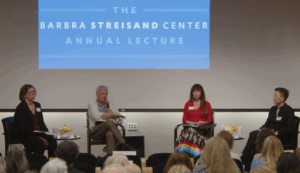The Truth About Freedom: How Lies Oppress and How Facts Liberate

On October 23, 2025, the third annual UCLA Barbra Streisand Lecture hosted a public lecture and panel discussion featuring renowned historian Timothy Snyder, Chair in Modern European History at the Munk School of Global Affairs & Public Policy, University of Toronto, and bestselling author of On Tyranny and On Freedom.
Snyder’s talk, “The Truth about Freedom: How Lies Oppress and How Facts Liberate,” provided a humanistic and urgent defense of truth as the prerequisite for liberty. The event also highlighted the vision of the future UCLA Barbra Streisand Institute, with its foundational focus on Truth in the Public Sphere.
Truth in the Public Sphere
The evening kicked off with a special video message from Barbra Streisand, the Institute’s visionary benefactor. Citing a lifelong commitment to activism and democracy, Streisand emphasized the discussion’s urgency. In her opening remarks she quoted Professor Snyder, stating: “To abandon facts is to abandon freedom.”
She praised UCLA’s faculty for their impactful research that will help dispel and combat disinformation in our democracy, expressing her deep eagerness to hear the insights offered by the panel of experts. Streisand concluded with a call to action, reminding attendees that “One voice can make a difference and voices joined in truth and resistance can preserve democracy itself.”
Keynote: The Truth about Freedom
Professor Snyder, introduced by Jessica Cattelino, Director of the UCLA Barbra Streisand Center, presented an argument that went “on the offensive” as a humanist. His core message: “The truth about freedom is that freedom requires the truth.”
Snyder distilled his case into seven fundamental “forms of truth” that help us live in a free society, challenging the audience to recognize how the denial of these truths serves the opponents of freedom.
The Seven Forms of Truth
- Metaphysical Truth: Freedom is the value of values because it enables us to pursue all other conflicting values (e.g., spontaneity vs. punctuality), allowing us to become individual characters and leave a unique trace.
- Corporeal Truth: The truth about freedom must be rooted in our shared human condition: we are born, we will die, and we will be sick. Freedom, therefore, requires collective work (like predictable access to education and healthcare) to allow individuals to be unpredictable. Accounts of freedom that ignore the body (death, illness, etc.) or promote immortality are fundamentally inconsistent with freedom.
- Dissident Truth: In an age of “big lies,” small truths matter. Freedom of speech exists primarily to allow the weakest among us to speak truth to power at physical risk, not to protect the powerful from scrutiny.
- Repertorial Truth: This is the truth brought by human beings who physically displace their bodies to investigate—local reporters and war correspondents. Reporting is the only way to uncover oligarchy and war and stop local corruption. Its absence creates news deserts where polarization rushes in and feelings overcome facts.
- Ecological Truth: Our life is rooted in this earth, and there is an ascertainable truth about it, most pressingly, global warming. Technology is not the problem; we are 100% the problem. Denying climate science or redirecting ecological anxiety against humans serves the opponents of freedom.
- Empathic Truth: As exemplified by philosopher Edith Stein, to be free, we must be reasonable, and to be reasonable, we must recognize the shared humanity of others—our ability to empathize with them through their bodies. This recognition prevents us from descending into irrationality and conspiracy.
- Historical Truth: History doesn’t repeat, but it does instruct. The historical truth is that many possibilities exist for both good and ill, and the choices we make matter. The opponents of freedom perpetuate a sense of inevitability to deaden political action.
Panel Discussion
The lecture was followed by a dynamic panel discussion featuring Professor Snyder alongside:
- Ju Hui Judy Han, Associate Professor, Gender Studies, UCLA
- Shannon Speed, Director, American Indian Studies Center, Special Advisor to the Chancellor on Native American and Indigenous Affairs, Professor, American Indian Studies, Anthropology and Gender Studies, UCLA
The conversation, moderated by Professor Jessica Cattelino, further explored the intersection of Snyder’s philosophical framework with the realities of indigenous sovereignty, gender, and social justice, emphasizing how the social sciences are essential in combating disinformation and building a thriving, free future.
Looking Ahead: The Streisand Institute
This event served as a reminder of UCLA’s role as an anchor institution for social impact. The Barbra Streisand Institute will continue to focus on the critical area of Truth in the Public Sphere, bringing the breadth of the university’s social sciences expertise to research and combat the widespread proliferation of “alternative facts”, disinformation, and unreliable sources of information in the public.
Learn more about the Barbra Streisand Institute at UCLA.
Image caption: From the October 23, 2025 panel following “The Truth About Freedom: How Lies Oppress and How Facts Liberate,” featuring Jessica Cattelino, Timothy Snyder, Shannon Speed, and Ju Hui Judy Han.

